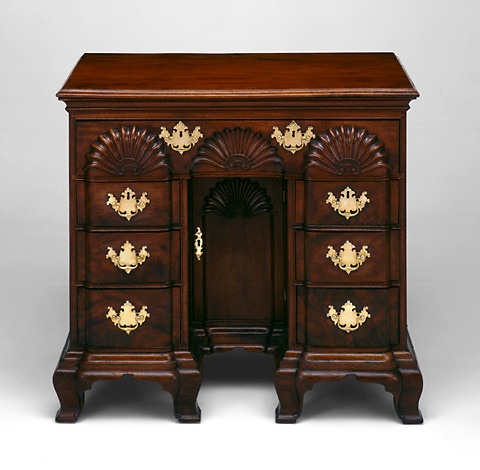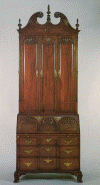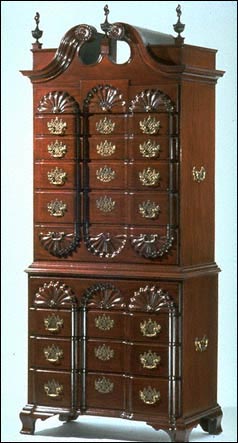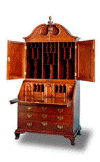Townsend Furniture
Townsend Family
American cabinetmakers working in Newport, R.I., during the 17th and 18th centuries and forming with the Goddard  family the Goddard-Townsend group, known for case furniture characterized by block fronts (divided into three panels, with the central panel recessed) and decorative carved shell motifs, frequently in the graceful and somewhat
family the Goddard-Townsend group, known for case furniture characterized by block fronts (divided into three panels, with the central panel recessed) and decorative carved shell motifs, frequently in the graceful and somewhat  ornate style developed by the English cabinetmaker Thomas Chippendale.
ornate style developed by the English cabinetmaker Thomas Chippendale.
Job Townsend (1699-1765) and his brother Christopher Townsend (1701-73) were the first generation involved in cabinetmaking. Job's daughter married John Goddard, then his apprentice and the first of the Goddard family associated with the Townsends. The only known piece bearing Job's label is a desk-bookcase at the Rhode Island School of Design, Providence. Other pieces attributed to him include a chest of drawers and a dressing table. Christopher's work was apparently much like that of his brother, although no existing pieces are definitely attributed to him.

Five of Job's sons became cabinetmakers. The account books of Job Edward Townsend, Jr. (1726-1818), list various pieces made to order. A bureau bears the label of Edmund Townsend (1736-1811). Thomas Townsend (1742-1822), a carpenter, was banished to Massachusetts by the British from 1775 to 1780. He later became an innkeeper. Robert M. Townsend (d. 1805) left a cabinetmaking business that was taken over by his brother Job. James Townsend (d. 1827) is considered by some authorities to be responsible for much of the carving that decorates pieces made by the Goddard-Townsend group.
Christopher's son John Townsend (1732-1809), recognized as one of the outstanding craftsmen of the group, was held by the British for several weeks in 1777 and is believed to have worked in Connecticut after his release, returning to Newport in 1782. About nine pieces bearing his label have been found. Labeled pieces of John's work include a chest of drawers, a breakfast table, a clock case, and other tables. The William Rockhill Nelson Gallery of Art, Kansas City, Mo., has two matching card tables, one bearing his label. John's brother, Jonathan (1745-72), also worked as a cabinetmaker.
Edmund's son Job E. (1758-78) was apparently apprenticed as a cabinetmaker, but he died at the age of 20. There is no indication that his two brothers became cabinetmakers.
John F., known to be living in 1829, was John's son. A desk at the Newport Historical Society is attributed to him, but his work is not considered equal in quality to that of his father.
-- Reprinted (except furniture photos) from www.britannica.com
© 1999-2000 Britannica.com Inc.